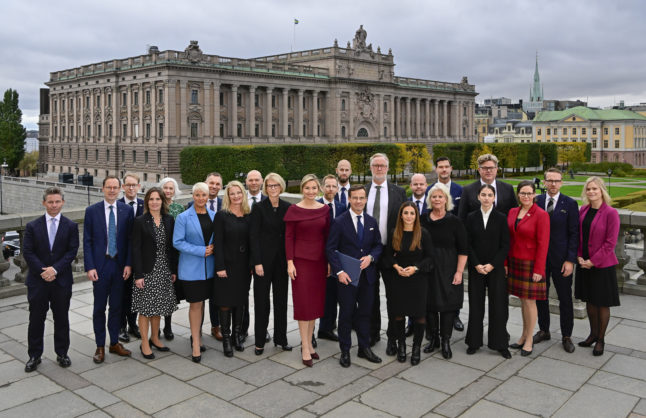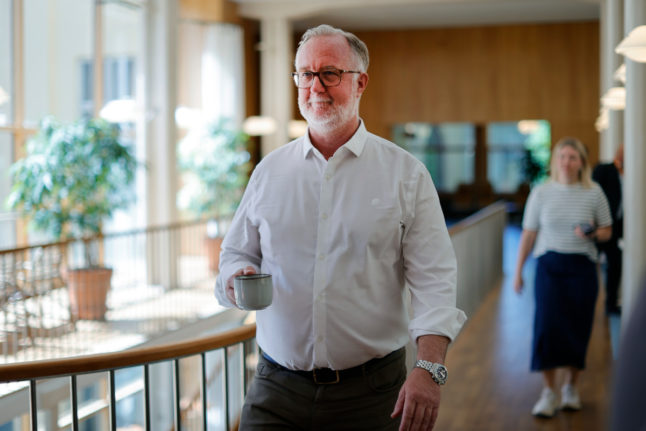Who are the new ministers in Kristersson’s cabinet?
Kristersson’s new cabinet features ministers from three different parties – the Moderates, the Liberals and the Christian Democrats. The fourth party in the right-wing coalition, the far-right nationalist Sweden Democrats, do not have ministers in the government despite being the largest party in their bloc, but will still have substantial influence over the new government’s policy.
Considering this new government is a complete change of power from the left-wing Social Democrats to a right-wing coalition government, every minister post has changed, as well as some ministries. Below is a rundown of the most notable appointments, you can see a full list of all the ministers appointed here.
Facts and figures
In terms of the share of ministers, the largest party in the government is the Moderates, with 12 ministers. The two smaller government parties, the Christian Democrats and the Liberals, each received roughly the same number of ministers: 6 for the Christian Democrats and 5 for the Liberals.
Of the 23 ministers in the new cabinet, just under half (11) are female. This is similar to the outgoing Social Democrat government, where 11 of 22 ministers were female.
Who are the Moderate ministers?
First off, we’ve got the heavyweight roles. Sweden’s new Finance Minister is Elisabeth Svantesson. She is the Moderate financial spokesperson, and she repeatedly appeared alongside Kristersson during the election campaign to discuss policy proposals such as high-cost protection for energy bills.
The new Justice Minister is also a high-up Moderate: Gunnar Strömmer, Moderate Party Secretary. Strömmer has previously worked as a lawyer, and is also the founder of legal charity Centrum för rättvisa, which stands up for individual rights and freedoms, who are notably deeply critical of the new government’s policy proposals.
The Defence Minister is Pål Jonson, who will also head up the Defence Department, where he will be joined by Civil Defence Minister Carl-Oscar Bohlin. Jonson is a trained political scientist with a doctoral degree in the science of war. He has been the General Secretary of the Swedish Atlantic Committee and has also worked at the Swedish Defence Research Agency. He has been political spokesperson for the Moderates since 2019.
Sweden’s new Foreign Minister is Tobias Billström, who has been a Moderate Party spokesperson since 2002 and has previously been the party’s spokesperson on migration and integration issues. He was Migration Minister in the last Moderate government under Fredrik Reinfeldt between 2006 and 2014, where he worked to increase labour migration to Sweden and spoke out in favour of a common European asylum and migration policy. He is also leader of the Moderate’s parliamentary group.
The Migration Minister is Maria Malmer Stenergard, also a Moderate, who has been Moderate Party migration spokesperson since 2019. She is a trained lawyer and has called for “tightened up and long-term sustainable migration policy” where integration is a key aspect. She has called for a pause on accepting quota refugees, wants to make it easier for foreign doctoral students to stay in Sweden, and criticised the previous Social Democrat government for not doing enough to combat so-called ‘talent deportations’.
The other Moderate ministers in the next government are EU Minister Jessica Roswall, Foreign Aid Minister Johan Forsell, Civil Defence Minister Carl-Oscar Bohlin, Social Services Minister Kamilla Waltersson-Grönwall, Minister for the Elderly and Social Insurance Anna Tenje, Financial Market Minister Niklas Dykman and Culture Minister Parisa Liljestrand.
What about the smaller parties?
The most interesting appointments here include Christian Democrat leader Ebba Busch’s new role as the Energy and Business Minister, as well as Deputy Prime Minister, and Liberal Leader Johan Pehrson taking over as Sweden’s next Labour Market and Integration Minister (so you’ll no doubt be hearing a lot about him at The Local over the next four years).
Johan Pehrson was tipped to become Education Minister, but that role has instead gone to Mats Persson, the Liberal Party’s financial spokesperson. The Liberals also supplied the Equality Minister (Paulina Brandberg), the Schools Minister (Lotta Edholm) and the Climate Minister, Romina Pourmokhtari, who at 26 is Sweden’s youngest-ever minister.
Aside from leader Ebba Busch, the other Christian Democrat ministers in the government are Peter Kullgren as Rural Affairs Minister, Andreas Carlson as Infrastructure and Housing Minister, Jakob Forssmed as Minister for Social Affairs, Acko Ankarberg as Health Minister and Erik Slottner as Minister for Public Administration.
Have any departments changed?
Yes. The Ministry for the Environment has been merged with the Ministry for Business, creating the new Ministry for Climate and Business, which is headed by Christian Democrat leader Ebba Busch. This means that instead of heading up the Ministry for the Environment, Climate Minister Romina Pourmokhtari will be working underneath Busch in the Climate and Business Ministry on environment issues.
The Ministry for Enterprise and Innovation has also been scrapped.



 Please whitelist us to continue reading.
Please whitelist us to continue reading.
Member comments